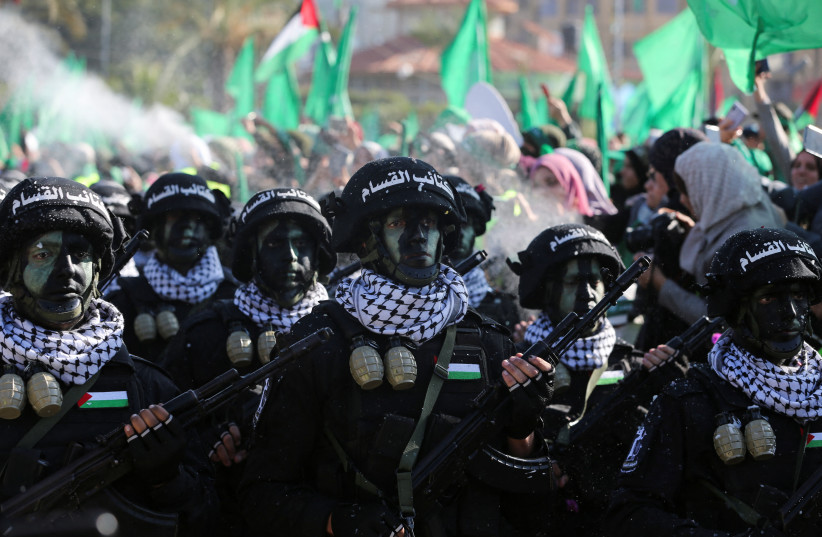The State of Israel is at war with Iran. This is not another round with Hamas in Gaza, but a bona fide war with the Islamic Republic of Iran, which is trying to prevent the normalization of ties between Israel and Saudi Arabia at all costs. We must not underestimate the capabilities of the terrorist organization Hamas; it is a highly-skilled Iranian-Palestinian army, built and trained by the Iranians throughout the years following Israel’s disengagement from the Gaza Strip. Iran has invested hundreds of millions of dollars in this endeavor each year. The Iranians have supplied Hamas with weapons and instructors to train its army, replicating the modus operandi they used in the establishment of a separate army in Lebanon-Hezbollah.
The State of Israel has suffered a severe blow. We were caught off guard, exactly 50 years after the surprise attack of the Yom Kippur War. Once again, we find ourselves reeling from the consequences of an intelligence-operational failure. Back then, the prevailing conception was that the Egyptians were not interested in war and could not breach the Bar-Lev Line along the Suez Canal.
This time, high-ranking security officials asserted that Hamas was deterred and disinclined towards escalation, and that the sophisticated technological measures along the border with Gaza would prevent terrorists from infiltrating Israeli territory. For months, we have been hearing the head of IDF Military Intelligence, current cabinet minister and former IDF chief of staff Gadi Eisenkot, and other senior officials warn that the State of Israel is in an extremely vulnerable security situation.
They cautioned that our adversaries are keenly aware of our weaknesses and were just waiting for the opportune moment to strike. Even the defense minister raised these concerns – the response was his dismissal. Their words fell on deaf ears. Even some senior members of the security establishment dismissed the threats and multi-arena war scenarios presented to them, displaying the same smugness and arrogance that was prevalent in 1973.
As in the Yom Kippur War, this time we were also caught by surprise. Hamas strategically created a false sense of calm before launching their attack. And just like in 1973, Hamas chose to strike on a Sabbath and a Jewish holiday, knowing that many soldiers would be on leave. However, though during the Yom Kippur War our military suffered heavy casualties, with thousands dead or wounded and hundreds taken captive, the home front remained outside of the combat zone.

This time, the majority of victims and captives are innocent civilians. Regular mothers, fathers, grandparents, children, babies, and young partygoers were massacred or taken captive. In the Yom Kippur War, the Syrians and Egyptians did not attack civilian communities and towns, but this time, they were Hamas’s target.
Palestinians fight for territory and interests, Israel fights for survival
But one fundamental truth has remained unchanged from the inception of the State of Israel to this day. We have always understood that we need to protect our home, and that if we don’t, we will not be protected as a nation. While the Palestinians and the Arabs are fighting for territory and interests, we are fighting for our very existence, for our survival.
This has also been the secret to Israel’s success since the day it was founded: in a war for existence, we have no option but victory. And thus, just as before, we will emerge triumphant, regardless of whether Hezbollah becomes involved or not.
In any case, the main losers will be the Palestinians, and if Hezbollah joins in, also the Lebanese. Iran is prepared to sacrifice the last drop of Palestinian and Lebanese blood in their zeal to fight Israel. Although the State of Israel is enduring an unprecedented blow, when the dust settles the Palestinians will face a response of a magnitude they have never encountered before. The same fate awaits the Lebanese if Hezbollah opts to enter the fray.
Today the Palestinians are celebrating the murder of children, women, and other innocent Israeli civilians, but they will not rejoice for long. Their lives in Gaza, which were difficult already, will now become unbearable for many years to come. Throughout the last century, the Palestinians have continuously brought disaster upon themselves, serving other masters and paying a heavy price for it.
Above all else, the greatest price to be paid by the Palestinians is that they have slaughtered, with their own hands, any chance for peace in the decades to come. No life-loving nation could place trust in such barbaric killers, let alone take the risks that peace entails.
May the memory of our fallen be a blessing. Buried with them are the prospects for peace in our time.
The writer is president of Reichman University.
